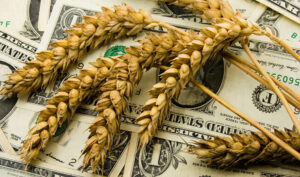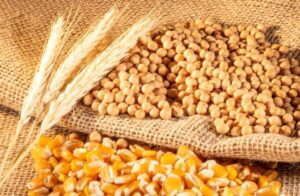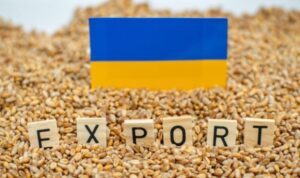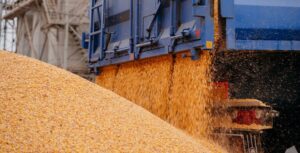
In April 2025, Ukraine exported 4.1 million tons of agricultural products, which is 23.4% less than the same indicator of the previous month, according to the Ukrainian Agribusiness Club.
“Such dynamics of export reduction is typical for this season. The vast majority of the grown products have already been exported, and there are still small volumes for export,” the analysts explained.
Experts noted that almost all groups of goods in April 2025 show a decline in exports. The only exception is vegetable oils, the export volumes of which are growing. This is due to the atypical situation on the Ukrainian sunflower oil market, whose production volumes were stretched over time this year.
According to them, in April 2025, the structure of agricultural exports was dominated by vegetable oils, which amounted to 525.8 mln tons, up 6% compared to the previous month. At the same time, sunflower oil accounted for 91% of exports, and soybean oil – 9%.
Grain exports decreased by 33% and amounted to 2.4 mln tons, with corn accounting for 65%, wheat – 32%, barley – 2%; oilseeds – by 3% to 421.2 thsd tonnes. tons (soybeans – 78%, rapeseed – 20% and flax – 1%), cake after extraction of vegetable oils – by 14% to 423.0 thousand tons (sunflower – 73%, soybean – 27%), other types of agricultural products – by 2% to 357.0 thousand tons.

In 2024, Ukraine increased its exports of agricultural products to the European Union by 11%, according to the EU’s report on trade in such products last year.
“The EU continued to import agricultural food products from various trading partners, with Brazil, the United Kingdom, and Ukraine being the main sources. Imports increased from Côte d’Ivoire, Ukraine and Nigeria, while they decreased from Russia and Australia,” the report, the full text of which is published on the European Commission’s website, says.
According to the published statistics, Ukraine was the third source of imports of agri-food products to the EU in 2024 (8% of the total value of imports). Agricultural imports from Ukraine to the EU increased by 11% compared to 2023 (+EUR1.3 billion) and reached EUR13 billion. This was mainly due to an increase in the share of two key commodities in imports: vegetable oils (EUR3 billion in 2024, +EUR946 million compared to 2023), and oilseeds and protein cereals (EUR3.1 billion, +EUR709 million).
At the same time, imports of Ukrainian grains to the EU decreased by 12% in value (to EUR 4.5 bln) due to lower prices, but their volume increased by 6% year-on-year.
At the same time, the total volume of European agricultural imports in 2024 reached a record high of EUR171.8 bln (+8% compared to 2023, or +EUR12.4 bln).
In terms of consumption of European agricultural exports, Ukraine ranks 13th with EUR3.634 billion, which is about 2% of the EU’s total agricultural exports (EUR235.4 billion). At the same time, in terms of consumption of European imported agricultural products, Ukraine showed an increase of 5% compared to 2023, when the country imported agricultural products worth EUR3.461 billion from the EU.

In March 2025, Ukraine exported 5.4 million tons of agricultural products, which is 9.8% more than the same indicator of the previous month, according to the Ukrainian Agribusiness Club (UCAB).
All groups of goods showed growth compared to the previous month, but the largest increase was in oilseed processing products, namely oilcake and oil, whose exports increased by 42% and 29%, respectively, analysts said.
According to their information, in February 2025, the structure of agricultural exports was dominated by cereals, which were supplied to foreign markets in the amount of 3.6 mln tons, which is 5% more than a month earlier. At the same time, corn accounted for 66% of exports, wheat – 31%, and barley – 2%.
At the same time, in March 2025, the export volumes of oilseeds increased by 4% to 433.6 thsd tonnes (soybean – 85%, rapeseed – 7% and sunflower – 6%), and by 29% of vegetable oils – to 495.6 thsd tonnes. tons (sunflower oil – 89% and soybean oil – 11%), by 11% of cake after extraction of vegetable oils – to 493.5 thousand tons (sunflower oil – 70%, soybean oil – 30%), by 11% of other agricultural products – to 363.2 thousand tons.

After the full-scale invasion and blocking of seaports in 2022, Ukraine began to actively use land routes for exporting agricultural products, which significantly reduced the transit of agricultural products through the EU, according to the Ukrainian Agribusiness Club (UCAB).
Analysts noted that the maximum volume exported across the borders of neighboring countries was 3.7 million tons of grains, oilseeds and their products in August 2023, when the “grain corridor” had already stopped working and Ukraine’s own sea route had not yet started working.
Experts stated that the structure of exports by country was as follows: Romania – 73% of the total exported volume (thanks to the seaport of Constanta), Poland – 14%, Hungary – 9%, Moldova – 2%, and Slovakia – 2%.
“Establishing its own export route has allowed Ukraine to reduce transit through neighboring countries. Over the past 6 months of 2024, the average monthly volume of exports through neighboring countries decreased by 3.7 times compared to the peak figure and averaged 1.0 million tons of grains, oilseeds and processed products,” the UCAB emphasized.
At the same time, in December 2024, compared to the peak, exports through the Romanian border decreased by 8.2 times to 0.3 million tons, Polish – by 1.9 times to 0.3 million tons, Hungarian – by 1.9 times to 0.2 million tons, Moldovan – by 8.9 times to 0.01 million tons and Slovak – by 12.0 times to 0.01 million tons.

In January 2025, Ukraine exported 5 million tons of agricultural products, which is 9.7% less than the same indicator of the previous month, according to the Ukrainian Agribusiness Club (UCAB).
“For the third month, there has been a downward trend, but this is typical for the winter period in the absence of force majeure,” analysts explained.
Speaking about the structure of exports in January 2025, they noted that the exports of grains decreased by 3% to 3.5 mln tonnes (corn – 72%, wheat – 26%, barley – 2%) compared to December 2024, oilseeds – by 39% to 352 thsd tonnes. tons (soybeans – 63%, rapeseed – 29% and sunflower seeds – 6%), cake after extraction of vegetable oils – by 22% to 406.3 thsd tonnes (sunflower – 67%, soybean – 33%), other agricultural products – by 24% to 329.5 thsd tonnes.
At the same time, the export of vegetable oils increased by 1% compared to December 2024, to 424.4 thsd tonnes (sunflower oil – 89% and soybean oil – 10%).
The analysts noted that the export volumes of grains and vegetable oils remained approximately at the level of the previous month. Oilseeds (-39%) and oilcakes after extraction of vegetable oils (-22%) showed the decline.
“In the current marketing year, the vast majority of agricultural products intended for export have already been exported, in particular, wheat – 64%, corn – 55%. Accordingly, in the coming months, a further slight reduction in export shipments is possible,” UCAB predicts.

Despite the temporary occupation of part of the agricultural land by the enemy, Ukraine demonstrated good results in the agricultural sector in 2024 and was able to return the historical ways of agricultural exports, and therefore offers the Portuguese Republic to strengthen cooperation, said Vitalii Koval, Minister of Agrarian Policy and Food, at an online meeting with José Manuel Fernandes, Minister of Agriculture and Fisheries of Portugal.
“In 2024, 57% of Ukraine’s agricultural exports went to the EU countries. In total, Ukraine exported agricultural products worth $24.6 billion, including $211.6 million to Portugal,” the Ministry of Agrarian Policy’s press service quoted the minister as saying.
In addition, he emphasized that last year Ukraine returned to its historical ways of agricultural exports, as 86% of agricultural products are exported through Odesa and Danube ports. According to him, Ukraine is actively working to open new markets, particularly in Africa and the Middle East.
Koval urged his Portuguese counterpart to work together to combat the illegal sale of Ukrainian grain to Russia.
The Minister also thanked the people of Portugal for their consistent support of Ukraine and the President’s humanitarian initiative Grain From Ukraine.